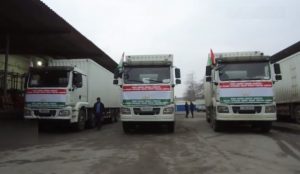WHO Representative: «Each Year, 800,000 People Die Due to Poor Sanitation and Poor-Quality Water»
Read also

DUSHANBE, 07.06.2022 (NIAT Khovar) – “During the forums and plenary sessions taking place today in Dushanbe, not only water problems are being discussed, but also the possibilities of achieving sustainable development goals in terms of healthcare. This is an important and timely step that will allow not only to discuss problems, but also to take appropriate necessary decisions. It is gratifying that these days Dushanbe has become a platform that has brought together many states to solve a common problem,” said Oliver Schmoll, head of the Water Resources and Climate Program at the WHO Regional Office for Europe.
“Our main goal is to protect the health of people in Central Asia. Health, hygiene and sanitation issues are discussed to solve problems and gradually improve the situation. Looking at the figures available for Central Asia, we can say that 95% of the population has access to a basic drinking water supply. In terms of sanitation, 95% have access to basic sanitation. This means that they use sanitary facilities that are not shared with other households. If you look at these statistics, you can conclude that this is a good result. However, if you consider the availability of safe bathrooms, safe sources of water that are protected from germs and chemical pollutants, then these figures drop sharply. Speaking about drinking water, I want to note that only 70% of Central Asia’s population have access to safe water sources. Today, unfortunately, we do not have accurate data on the sources of water and sanitation,” commented Schmoll.
According to the data given by him, in some countries, it is possible that not all households have access to soap and water. There is a gap in improving hygiene and sanitation. It is important to note the significant disparities in access to basic services.
“Statistics concerning 95% of the population with access to such basic services do not apply to the rural and poor population. There are significant disparities in this regard. It is the rural and poor population that is most disadvantaged and marginalized. In Central Asia, problems with diseases such as diarrhea arise from the consumption of surface water. People who consume water from open water sources often have serious health problems. Every year, 800,000 people die due to poor sanitation and poor-quality water,” added Schmoll.










 Tugay Forests of the Tigrovaya Balka Nature Reserve Included in the UNESCO World Heritage List
Tugay Forests of the Tigrovaya Balka Nature Reserve Included in the UNESCO World Heritage List TAJIKISTAN IS TAKING SUSTAINABLE STEPS TO PROVIDE THE RIGHTS AND FREEDOMS OF HUMAN AND CITIZEN. In the light of the adoption of the National Strategy of Tajikistan in the field of human rights protection for the period up to 2038
TAJIKISTAN IS TAKING SUSTAINABLE STEPS TO PROVIDE THE RIGHTS AND FREEDOMS OF HUMAN AND CITIZEN. In the light of the adoption of the National Strategy of Tajikistan in the field of human rights protection for the period up to 2038 Buta Airways Carries First Baku — Dushanbe Flight
Buta Airways Carries First Baku — Dushanbe Flight President of Tajikistan Sends Humanitarian Aid to Earthquake Affected People in Syria
President of Tajikistan Sends Humanitarian Aid to Earthquake Affected People in Syria President Sends Aid to Families Affected by the Natural Disaster in the Gorno-Badakhshan Autonomous Region
President Sends Aid to Families Affected by the Natural Disaster in the Gorno-Badakhshan Autonomous Region Prime Minister Rasulzoda Visits Khorug
Prime Minister Rasulzoda Visits Khorug IRS: The Consequences of Avalanches Have Been Eliminated on the Dushanbe-Chanak Highway and Traffic Has Been Provided
IRS: The Consequences of Avalanches Have Been Eliminated on the Dushanbe-Chanak Highway and Traffic Has Been Provided President Emomali Rahmon Calls 2022 Another Historic Year for Tajikistan
President Emomali Rahmon Calls 2022 Another Historic Year for Tajikistan UNGA Supports President Rahmon’s Initiative to Declare 2025 as the International Year of Glacier Protection
UNGA Supports President Rahmon’s Initiative to Declare 2025 as the International Year of Glacier Protection GEOLOGIST’S DAY. How Rich Is Tajikistan and Why Is It Important to Develop Geology in the Modern World?
GEOLOGIST’S DAY. How Rich Is Tajikistan and Why Is It Important to Develop Geology in the Modern World? Kazakhstan Plans to Open a New Flight to Dushanbe in 2023
Kazakhstan Plans to Open a New Flight to Dushanbe in 2023 Jazeera Airways Will Connect Kuwait with Tajikistan
Jazeera Airways Will Connect Kuwait with Tajikistan













